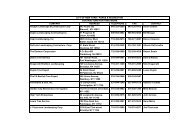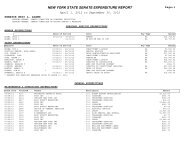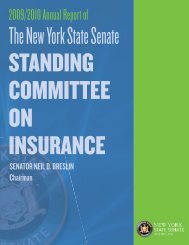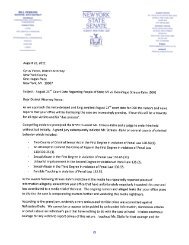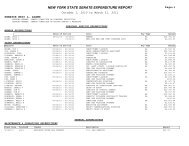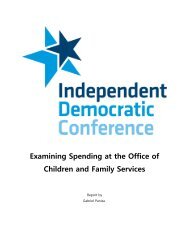Crime Committee Report e.indd - New York State Senate
Crime Committee Report e.indd - New York State Senate
Crime Committee Report e.indd - New York State Senate
You also want an ePaper? Increase the reach of your titles
YUMPU automatically turns print PDFs into web optimized ePapers that Google loves.
“Push-polling” is the latest and most fashionable in a long line of political dirty tricks and has<br />
no place in <strong>New</strong> <strong>York</strong> <strong>State</strong>’s political process. This legislation is designed to ban the practice of<br />
“push-polling” by requiring strict and comprehensive disclosure requirements to voters receiving<br />
calls or other contacts and to local board of elections. This legislation also codifies existing<br />
<strong>New</strong> <strong>York</strong> <strong>State</strong> Board of Elections regulations requiring the comprehensive disclosure of legitimate<br />
polling when the results of that polling are used to influence the outcome of elections.<br />
S4041-B<br />
DUANE, BRESLIN, DILAN, ESPADA, HASSELL-THOMPSON, KRUEGER, MONTGOMERY,<br />
OPPENHEIMER, PARKER, PERKINS, SAVINO, SCHNEIDERMAN, SQUADRON, STAVISKY,<br />
THOMPSON<br />
Marijuana for Medicinal Purposes<br />
Thousands of <strong>New</strong> <strong>York</strong>ers have serious medical conditions that may benefit from medical<br />
use of marijuana. The National Academy of Sciences’ Institute of Medicine concluded in a<br />
1999 report that “nausea, appetite loss, pain and anxiety ... all can be mitigated by marijuana.”<br />
Doctors and patients have documented that marijuana can be an effective treatment -where<br />
other medications have failed - for at least some patients who suffer from HIV/AIDS, cancer,<br />
epilepsy, multiple sclerosis, and other life-threatening or debilitating conditions. Although<br />
other drugs are more effective than marijuana for some patients, The Institute of Medicine<br />
noted that “there will likely always be a subpopulation of patients who do not respond well to<br />
other medications.” Medical marijuana must be available to those patients.<br />
The active ingredient in marijuana, THC, has been approved for medical use by the Federal<br />
Food and Drug Administration and the Drug Enforcement Agency since 1986 in synthetic pill<br />
form. But consuming it in natural form - which many physicians say is more effective - continues<br />
to be illegal. In an editorial in the January 30, 1997 <strong>New</strong> England Journal of Medicine, Dr.<br />
Jerome P. Kassirer, editor of the Journal, explained that inhaling THC is more effective than<br />
taking the synthetic pill: “smoking marijuana produces a rapid increase in the blood level of<br />
the active ingredients and is thus more likely to be therapeutic.” It also enables tighter control<br />
of the amount ingested. According to the Institute of Medicine, it is well recognized that (the)<br />
oral route of administration hampers its effectiveness because of slow absorption and patients’<br />
desire for more control over dosing.”<br />
Legalizing the medical use of effective medicine does not undermine the message that nonmedical<br />
use of illegal drugs is wrong. Many controlled substances that are legal for medical use<br />
(such as morphine, valium and steroids) are otherwise illegal. In the same <strong>New</strong> England Journal<br />
of Medicine editorial, Dr. Kassirer argued that “it is also hypocritical to forbid physicians to<br />
prescribe marijuana while permitting them to use morphine and meperidine to relive extreme<br />
dyspnea and pain.”<br />
The bill amends the Public Health Law rather than the Penal Law because the Penal Law’s<br />
controlled substances provisions all relate back to the Public Health Law. Thus, all the acts that<br />
the bill makes lawful under the Public Health Law would, by definition, be legal under the<br />
Penal Law.<br />
S.4251 SCHNEIDERMAN, DIAZ, HASSELL-THOMPSON, PARKER<br />
Toll Collection Violations<br />
This bill would: (1) add toll evasion to the theft of services crimes; (2) create a new Title XII<br />
entitled Toll Collections; (3) increase the monetary penalties for toll collection violations and<br />
provide that one- half of such penal ties collected be paid to the public authority whose toll<br />
collection violations were violated and would make the payment of lost toll revenue to the toll<br />
facility a mandatory part of the penalty when a toll collection violation is adjudicated in court;<br />
(4) clarify that a public authority may impose administrative fees on the owner of a vehicle that<br />
violated the toll collection regulations; and (5) revise the current mandatory vehicle registration<br />
suspension where the owner of a motor vehicle failed to appear, failed to pay any penalty<br />
68<br />
<strong>New</strong> <strong>York</strong> <strong>State</strong> <strong>Senate</strong>



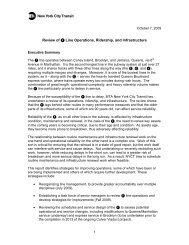


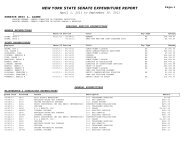
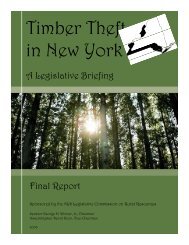
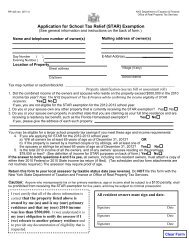
![[PDF] Proposed MTA Capital Program - New York State Senate](https://img.yumpu.com/24854139/1/190x245/pdf-proposed-mta-capital-program-new-york-state-senate.jpg?quality=85)

